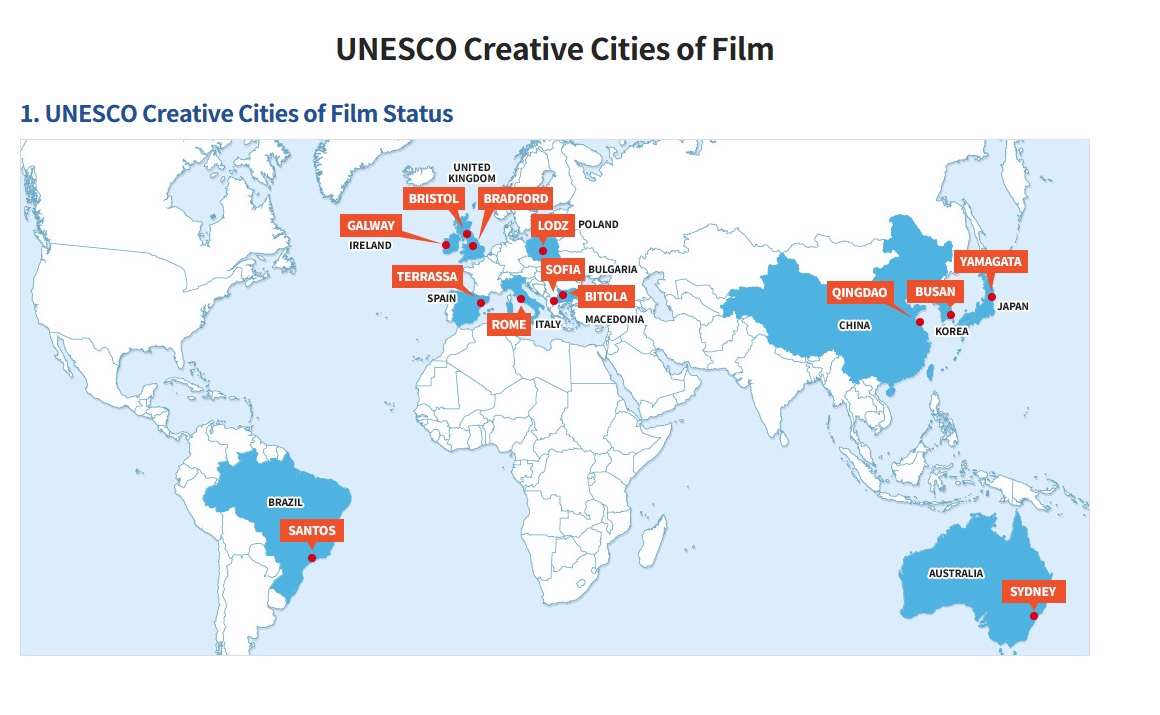4th Forum of UNESCO Creative Cities of Film – “Highlighting The Role of Women in Media”
Gender equality is one of the developing goals of the United Nations and one of UNESCO’s global priorities, which means that it is recognized as a key tool for social development and is essential for the development of sustainable development. The COVID-19 pandemic has exacerbated the continuing denial of women’s rights and violence. Despite the steps taken to strengthen the framework of policies and laws, substantial (de facto) equality remains to be maintained in North Macedonia. Over the years, there have been several steps that strengthen the position of women in society. North Macedonia has ratified the Istanbul Convention of the Council of Europe was has prepared a National Strategy for Gender Equality 2021-2026. Progress in gender equality and women’s empowerment has a central place not only in the 2030 Agenda for Sustainable Development but also in the accession of the country to the EU.
The introduction of more accurate gender statistics in culture is one of the goals of the National Strategy for Gender Equality. According to the statistics in the culture, women employees make about 40%, while women directors make up 37.5% versus 62.5% male directors. In the audiovisual media, since 2018, the Film Agency of North Macedonia has started preparing the strategy “Women in the film industry”, in order to raise the percentage of female authors. Only 21% in the last 10 years are directed by women, mostly short films and documentaries. But in 2019, two of the six state-funded films were directed by women. In this regard, it is interesting to mention that in 2021 the Film Agency launched an initiative to highlight women involved in the Macedonian film industry in 2021. In this regard, is good to mention that more and more women are enrolling in film studies, not only in the departments of directing and production but also in the departments of film camera, where a growing trend is noticeable.
Taking all of the above mentioned, and in continuation to the networking between the member cities of the UNESCO Creative Cities network, Film Center Bitola is organizing the 4th Forum of Creative Cities for Film from the UNESCO network “Women in audiovisual media – highlighting the role of women in audiovisual media” from 21st to 23rd November in Bitola. The topic has attracted particular interest and approval from other cities that are members of the network, especially taking into account the latest data and evidence from the European Audiovisual Observatory demonstrating the inequality between women and men in Europe. The statistics show that women make only one-third of film producers, and only 10% of film composers. For the European film industry, gender parity is still a long way off. Despite pledges by festivals, funding bodies and industry associations to work to narrow the gender gap, fewer than one in four working directors in Europe are female. The gender gap was most pronounced among cinematographers where women make up only 9%.
BITOLA
Located in the south of North Macedonia, Bitola is second largest city in the country with around 100,000 inhabitants. The city’s film heritage originated from the early 20th century with the film industry now representing the backbone of the city’s creative economy. Bitola’s history with film dates back to the Manaki brothers, Yanaki and Milton who as film and photography pioneers, brought to Bitola – formerly named Manastir – the Bioscope 300 film camera. Te brothers famously filmed the very first motion pictures shot in the Ottoman Balkans. Bitola is mostly known for the Manaki Brothers International Cinematographers Film Festival and Non Professional Documentary Film Festival – Camera 300 which celebrated 40 years in 2019. Also, the city is recognized as an open studio and thanks to its famous for the beautiful locations, in and around the city, a lot of films are shot each year in Bitola and the surrounding villages. Near Bitola is Heraclea Lyncestis. It was an ancient city in Macedon, ruled later by the Romans. Its ruins are situated 2 km (1.2 mi) south of the present-day town of Bitola. It was founded by Philip II of Macedon in the middle of the 4th century BC. The city was named in honor of the mythological hero Heracles. The name Lynkestis originates from the name of the ancient kingdom, conquered by Philip, where the city was built.
Bitola became a UNESCO City of Film in 2015, joining 180 members from 72 countries. As a Creative City of Film, Bitola envisages:
1. Nurturing the vibrant role of film in Bitola’s creative economy, notably by expanding the scope of the programme Film Center Bitola through public private partnerships involving public cultural centres, universities, academia and private production companies;
2. Fostering the city’s cultural offerings through exhibitions, festivals, workshops and other events especially based on the film heritage of the Manaki brothers;
3. Positioning Bitola as an international hub for film creations;
4. Exchanging experience and knowledge with other Creative Cities of Film
Bitola is one of 21 Cities of Film in the network. As part of the network, Bitola gets new opportunities for promotion and further development of the film story of the city. This potential was recognized by the Ministry of Culture of North Macedonia. Namely, in 2019 a first forum was held with the participation of representatives from other cities on the UNESCO film city network. In 2020, the second Forum of Creative Cities from the UNESCO network in Bitola was held, with a focus on various topics from the creative industries and film, sharing experiences, workshops and similar. In 2021, the Third Forum managed to gather more than 30 domestic and foreign participants with the support within the UNESCO Participation Program for 2020-2021.
Organizer
Founded in 2017, FILM CENTER BITOLA is a non-profit organization dedicated to the development of film as an artistic medium in Bitola. It was founded by a group of professionals in the field of culture, as well as film lovers and professors. As to this end, it co-ordinates Bitola`s activities related to the statute as a creative city of the film within UNESCO, as well as a number of activities related to Bitola as a UNESCO Film City, as well as other film activities that emerge from the specificity of Bitola as a film center of the Republic of North Macedonia.
The main goal is to help in the realization of existing projects and manifestations organized by the City of Bitola, especially in the field of film. The association provides services for the city’s film-related activities and relations with the film industry, develops the awareness of the public, the benefits and significance of the film industry in Bitola and the wider economic area.
ORGANISATION COMMITTEE
Film Center Bitola
Shirok Sokak 37
7000 Bitola
+389 (79) 233 176
centarzafilmbitola@gmail.com
bfc.mk
Venues
HOUSE OF ARMY (OFICERSKI) IN BITOLA
“Oficerski” or The House of Army (Офицерски дом) in Bitola, according to its historical and architectural aesthetic values, has the status of a monument of culture in the Republic of Macedonia. The construction of the building started in 1909, and in 1912 the building was covered. Its construction was completed after the First World War. The architectural expression of the building is typical of the period of historicism in European architecture in terms of plan, decoration, and composition tables, with the highlighted Oriental elements. The emergence of these elements in Bitola is normal when it comes to objects built during the period of Turkish rule.
Conceptually the object is built as a synthesis of a palace and fortress. Elements of the palace are in the conception of space and masses, and the fortress is visible in the elements in monumental space and secondary decorative plastics derived in the form of cannon tubes. Officer’s house was a location for the Turkish, Serbian, Bulgarian, Yugoslav, and Macedonian army. Here once the door was opened only for generals and officers and this was the only preserved ballroom in Bitola. Marshal Tito stayed here, Suleyman Demirel, chess player Karpov and others.
MANAKI CINEMA
In 1921, the brothers Janaki and Milton Manaki bought a yard on Shirok Sokak with the intention of building a cinema hall and founded the Manaki Cinema. The first cinema screening was shown in the summer garden in August, and in the spring of 1922 the construction of the building began. In 1933, the bankruptcy of the cinema was announced, which gave the bank the right to dispose of it, and in 1939 the building was affected by a fire and burned to the ground.
Today’s cinema Manaki is built on a location close to the former, with the support of the EU Funds and funds from the Ministry of Culture and the Municipality of Bitola. Only in the part of the front facade resembles the former cinema of the Manaki brothers, but increases the capacity of the Municipality of Bitola for development of cinema culture and sends a strong message to the people of Bitola and the world, that tradition and living cultural heritage are part of local cultural policies and identity.

